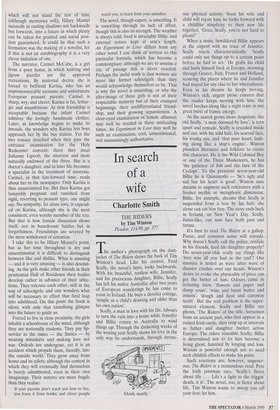In search of a wife
Charlotte Smith
THE RIDERS by Tim Winton Picador, £14.99, pp. 377 The author's photograph on the dust- jacket of The Riders shows the back of Tim Winton's head. Like his creator, Fred Scully, the novel's hero, looks backwards. With his beautiful, restless wife, Jennifer, and his precocious daughter, Billie, Scully has left his native Australia; after two years of European wanderings he has come to roost in Ireland. He buys a derelict cottage, `simple as a child's drawing and older than his own nation'.
Scully, a man in love with his life, labours to turn the ruin into a home while Jennifer and Billie return to Australia to wind things up. Through the darkening weeks of the waning year Scully shows his love in the only way he understands, through strenu-
ous physical activity. Soon his wife and child will rejoin him; he looks forward with a childlike simplicity to their new life together. `Geez, Scully, you're not hard to please!'
When a mute, bewildered Billie appears at the airport with no trace of Jennifer, Scully reacts characteristically: 'Scully could only see things up to a pertain point before he had to act.' He grabs his child and hurls himself back at Europe, storming through Greece, Italy, France and Holland, scouring the places where he and Jennifer had stayed for any clue to her whereabouts. Even in his dreams he keeps moving. Winton's rich, urgent prose ensures that the reader keeps moving with him; the novel lurches along like a night train in one great burst of frantic energy.
As the search grows more desperate, the old Scully, 'a man doomed by love', is torn apart and remade. Scully is revealed inside and out, with his wild hair, his scarred face, his wonky eye, and 'that pure heart, lunk- ing along like a ship's engine'. Winton plunders literature and folklore to create this character. He is the Wild Colonial Boy or one of the Three Musketeers, he has `the patience of Job and the face of the Cyclops'. To the prescient seven-year-old Billie he is Quasimodo — 'he's ugly and sad but his heart is good'. Winton uses dreams to augment such references with a fresher mythic or metaphoric dimension. Billie, for example, dreams that Scully is suspended from a tree by his hair; she alone can cut him free. The story ends back in Ireland, on New Year's Day. Scully, Janus-like, can now face both past and future.
It's best to read The Riders at a gallop. Pause, and common sense will intrude. Why doesn't Scully call the police, confide in his friends, feed his daughter properly? Do seven-year-olds really say things like `love was all you had in the end'? Our stamina is tested as wave after wave of disaster crashes over our heads. Winton's desire to evoke the physicality of place can get the better of him. Odours come in irritating trios: 'flowers and paper and damp coats', 'wine and burnt butter and onions', 'dough and heat and carraway seeds'. But the real problem is the super- natural element. Scully and Billie see ghosts, 'The Riders' of the title, horsemen from an ancient past, who first appear in a ruined Irish castle, then crop up at intervals as father and daughter bucket across Europe. The riders resemble Scully; Billie is determined not to let him become a living ghost, haunted by longing and loss. Winton is powerful enough not to need such childish effects to make his point.
Such reactions are, however, ungener- ous. The Riders is a tremendous read. Pete the Irish postman says, 'Scully's fierce about life . . . Life's a fight to the friggin' death, it is'. The novel, too, is fierce about life. Tim Winton wants to sweep you off your feet; let him.


























































 Previous page
Previous page